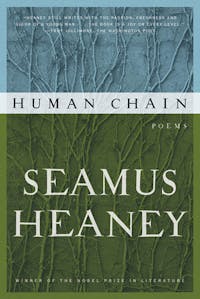Human Chain
Poems
 Download image
Download image
ISBN10: 0374533008
ISBN13: 9780374533007
Trade Paperback
96 Pages
$16.00
Winner of the Irish Times Poetry Now Award
Shortlisted for the T.S. Eliot Prize for Poetry
Human Chain elicits continuities and solidarities, between husband and wife, child and parent, then and now, inside an intently remembered present—the stepping stones of the day, the weight and heft of what is passed from hand to hand, lifted and lowered. The collection also broaches larger questions of transmission, of lifelines to the inherited past. There are newly minted versions of anonymous early Irish lyrics, poems that stand at the crossroads of oral and written, and other "hermit songs" that weigh equally in their balance the craft of scribe and the poet's early calling as scholar. A remarkable sequence entitled "Route 101" plots the descent into the underworld in the Aeneid against single moments in the arc of a life, from a 1950s childhood to the birth of a first grandchild. Other poems display a Virgilian pietas for the dead—friends, neighbors, family—that is yet wholly and movingly vernacular.
Human Chain also includes a poetic "herbal" adapted from the Breton poet Guillevic—lyrics as delicate as ferns, which puzzle briefly over the world of things and landscapes that exclude human speech, while affirming the interconnectedness of phenomena, as of a self-sufficiency in which we too are included.
Reviews
Praise for Human Chain
"In these poems Mr. Heaney casts vigorously about through moments in his life, from childhood through restless middle age. The poems read less like nostalgia than the signs of a still-vital poet feeling along the walls of his own cranium, his own complicated history . . . [Heaney's] authority, in Human Chain, is undiminished."—Dwight Garner, The New York Times
"Heaney still writes with the passion, freshness and vigor of a young man. Human Chain, which sits comfortably alongside such accomplished earlier collections as Field Work and Station Island, feels at times less like a late work than a first book by a remarkably gifted and promising young poet . . . the book is a joy on every level. The voice is strong and assured, the images are vivid and memorable. Most important, the music, as always with Heaney, is lovely."—Troy Jollimore, The Washington Post
"Nobel laureate Heaney is an earthy and mythic poet who channels the music and suffering of Ireland and, beyond that, the spiral of cultivation and destruction that sustains and endangers humankind. These are loamy, time-saturated poems, at once humble and exalted, taproots reaching into the underworld, flowers opening to the sun. Heaney writes of summer frolicking, hay baling, the death of a child, a hunger striker, berries, eels, and coal. Fluent in the classics, Heaney offers a redolent variation on the Aeneid titled 'Route 110,' in which the world of paved roads and motor vehicles is revealed to be but a thin veneer. 'Bread and pencils,' Heaney chants, holding fast to the nurturing, sensuous realm; to stones and plants and old books; to the way poems and stories link a boy to the 'glittering reeling chain' that is human history. Just as heavy sacks of grain handed from aid worker to aid worker chart the ceaseless river of disasters and need, of succor and connection. Heaney puts faith in the actual, be it the wind, a kite, or an extended hand."—Donna Seaman, Booklist
"Nostalgia and memory, numinous visions and the earthy music of compound adjectives together control the short poems and sequences of the Irish Nobel laureate's 14th collection of verse, a work of familiar strengths and unparalleled charm. Old teachers, schoolmates, farmhands, and even the employees of an 'Eelworks' arrive transfigured through Heaney's command of sound . . . The title poem applies Heaney's gift for physical mimesis to an image from the day's news: 'bags of meal passed hand to hand . . . by the aid workers' remind the poet of the grain-sacks he swung and dragged in his own youth. Other pages remember, and praise, libraries and classrooms—from grade school, from Harvard, and from medieval Irish monasteries, with their 'riddle-solving anchorites.' For all the variety of Heaney's framed glimpses, though, the standout poems grow from occasions neither trivial nor topical: Heaney in 2006 had a minor stroke, and the discreet analogies and glimpsed moments in poems such as 'Chanson d'Aventure' (about a ride in an ambulance) and 'In the Attic' ('As I age and blank on names') bring his characteristic warmth and subtlety to mortality, rehabilitation, recent trauma, and old age."—Publishers Weekly



